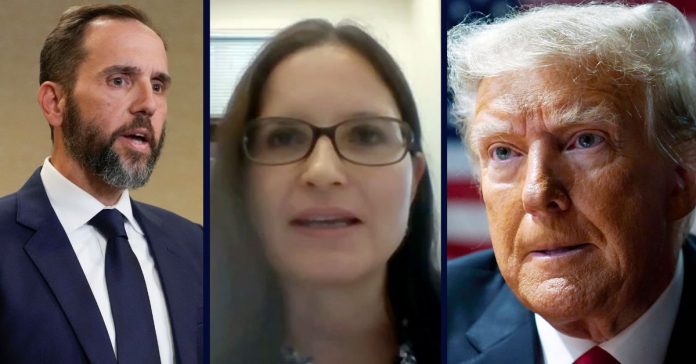
Left: Special Counsel Jack Smith (AP Photo/J. Scott Applewhite, File); Center: Aileen M. Cannon speaks remotely during a Senate Judiciary Committee hearing (U.S. Senate); Right: Donald Trump speaks with supporters at the Westside Conservative Breakfast, June 1, 2023, in Des Moines, Iowa. (AP Photo/Charlie Neibergall, File)
A federal judge late Tuesday agreed to keep secret the names of potential government witnesses in former President Donald Trump’s Mar-a-Lago classified documents case — while managing to make her displeasure palpable in the order granting the government’s requests.
In her 24-page order, U.S. District Judge Aileen Cannon ruled in favor of the state and the defense, in part, and at least, for now.
The ruling marks something of a limited-duration denouement to a long-running procedural dispute — one that threatened to become a broader appellate fight — in the Southern District of Florida. That dispute featured the state on one side and the defendants and Cannon on the other over a large set of discovery materials.
Cannon spends over five pages dealing with what she describes as the “lengthy procedural history” of the since-stilled dispute.
In February, the court controversially ruled the government must file those documents with minimal redactions — denying requests from prosecutors to seal or redact the names of government witnesses in some of the materials they have already given to defense attorneys.
Days later, Cannon paused her order after Special Counsel Jack Smith, in a 22-page motion for reconsideration and stay, termed her decision to publicly reveal those would-be witness names “clear error.” That argument was widely viewed as a signal the government was prepared to bring the 11th Circuit Court of Appeals, which has reversed Cannon in the case before, into the latest contretemps.
Throughout the filing of several back-and-forth motions related to the discovery dispute over witnesses, the defense and the state filed related motions over other discovery materials — including certain grand jury materials and a floor plan of Mar-a-Lago. In each instance, the story was more or less the same: the government wanted to keep those documents under wraps; the defense argued the materials are public records which should be released with limited censoring.
In her Tuesday order, Cannon makes sure to argue her earlier order — which she is now reversing — was both on firm legal ground and carefully drafted to address concerns about agreed-upon redactions.
“Guided by the strong presumption of public access to criminal proceedings, the Court applied the unobjected-to First Amendment standard,” the new order reads. “Under this standard — along with the well-established rules governing public access in this District — the Court determined that ‘the Special Counsel has not set forth a sufficient factual or legal basis warranting deviation from the strong presumption in favor of public access to the records at issue.’ The Orders also set deadlines for the sealed submission of the parties’ respective filings for the Court’s review prior to public docketing.”
The judge spends well over two pages criticizing Smith for belatedly raising legal arguments — saying the special counsel “could have, and should have, been raised in prior filings” and that the court had several independent bases on which to deny the government’s motions.
Cannon also takes the time to question Smith’s command of the law — particularly in the realm of First Amendment analysis.
“The Special Counsel’s initial Seal Request failed to offer a governing legal framework or any factual support for the relief sought; instead, it contained only conclusory and unsubstantiated assertions about witness safety, the integrity of the proceedings, and privacy interests,” the Tuesday order reads. “Later, in response to the Press Coalition’s Motion, the Special Counsel failed to engage with — let alone refute — the Press Coalition’s argument that the First Amendment attached to the subject materials.”
Now, however, none of that matters, Cannon says, because she is exercising her “discretion” to revisit the record following several filings and a March hearing. And here, the court observed, precedent is not “straightforward” — but does not lean in Trump’s favor either.
Cannon’s new order explains her self-reversal reasoning at length:
Although the record is clear that the Special Counsel could have, and should have, raised its current arguments previously, the Court elects, upon a full review of those newly raised arguments, to reconsider its prior Order. Having done so, the bottom line is this. The Eleventh Circuit has not specifically addressed the instant question: whether, in a criminal proceeding, the First Amendment qualified right of access attaches to discovery materials referenced or attached in support of a publicly filed Rule 12(b) motion to compel discovery under Rule 16. Nevertheless, the most faithful application of Supreme Court and available Eleventh Circuit authority is that Defendants’ MTC in this case is not subject to a public right of access, whether constitutional or common law in nature, because it is a still, ultimately, a discovery motion as distinct from a substantive pre-trial motion requiring judicial resolution on the merits.
“Although the Special Counsel’s request remains sweeping in nature as applied to all potential government witnesses without differentiation — and although the Court was unable to locate another high-profile case (in publicly available records) in which a court granted a broad-based pre-trial request to seal the identities of all potential prosecution witnesses as sought here — the Court is satisfied that the Special Counsel has made an adequate showing on this issue under Rule 16, at least at this juncture pending final trial preparations,” the order continues.
As part of the court’s order, the government must prepare “an index containing the name of each potential government witness and a corresponding pseudonym/anonymization for use in the redactions” that will be used on the redactions in the defendants’ publicly-filed motion to compel discovery. The judge offers the following example: “(e.g., ‘John Smith’ — NARA Employee 1).”
In a partial ruling for the defense, Cannon allowed the defense to quote from a U.S. Secret Service email chain but to “redact any information that could be used to directly identify witnesses.” Trump and his co-defendants can also produce a search warrant for one of their Gmail accounts — again with relevant redactions.
Both sides notched formal losses as well. The defense cannot publish the Mar-a-Lago floor plan or certain grand jury materials.
The government’s request to wholly bar the publication of “all witness statements relied on in pre-trial motions” was denied by Cannon as too “sweeping.” The defense can publish those statements, once again, so long as they do not identify any potential witnesses.
Have a tip we should know? [email protected]

